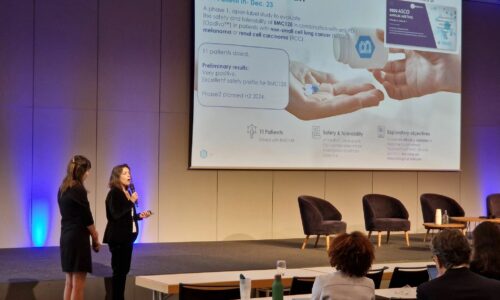At Pharmabiotics 2021 Conference & Partnering, Adrien Nivoliez, Biose Industrie CEO, held an Interactive Roundtable Discussion called Microbiome Therapeutics – the investment cycle from discovery to commercialization. Nivoliez spoke with Denise Kelly, Investment Advisor at Seventure Partners, and Paul Wagner, President & CEO of Forte Biosciences, about how microbiome companies can succeed in getting the funding they need and continue the momentum all the way to market.
The panelists agreed that, over the past ten years in the microbiome field, tremendous progress has been made on science and validation—and that with the first large, well-controlled clinical trials came an inflection point of investor interest. Seventure is one of the first firms to consolidate the microbiome as an asset, specifically in the area of pharma, but also with consumer opportunities. Meanwhile, Forte Biosciences is an example of a fast-progressing microbiome pharma company, with its goal of developing live biotherapeutic products (LBPs) for inflammatory skin disease. The company’s first product is a 3-strain product for atopic dermatitis.
Many microbiome companies, of course, still experience challenges with regulatory paths as well as pre-clinical models and clinical development. With the panelists’ collective expertise in both science and finance, they discussed how to overcome some of these challenges and how to set up a company for maximum success.
Companies need ‘high-end science’, but many modalities are possible. The number one thing investors will look for, according to Kelly, is thoughtful, high-quality science. But she says as long as the scientific story is compelling, it can pertain to any modality: fecal microbiota transplantation-like products, single-strain LBPs, consortia, or molecules; and the products could be bacterial or non-bacterial.
Strong validation data is essential. Since most companies are pre-clinically funded, said the panelists, the validation data is especially important. It may seem difficult to pin the value of the company on data from imperfect preclinical models, but investors will look at the totality of the data and the converging evidence from different models. Thus, it’s important to include several models in the validation stage where possible; using humanized models adds value in many cases.
Furthermore, innovation is good, but more innovation means very significant validation will be required. For example, investors will typically want to see more validation data on genetically modified organisms as compared to unmodified organisms.
The science intellectual property (IP) position should be clear-cut. The panelists noted one of the top mistakes for microbiome companies is not securing IP. The teams that are primed for success have carefully thought through their IP position and can articulate it clearly to potential investors.
Companies need a strong team with vision. The team is also an important part of investor decisions: has the company recruited the right people to get the job done? Is there evidence that they’re excited and aligned in their vision? Once company leadership articulates a business plan, investors will want to see the follow-through to the personnel who can execute on it.
The feasibility of taking the product through to market should be clear. The panelists agreed excellent science is only a starting point – it must also be feasible to translate the science into a product. For example, a promising bacterium that cannot be manufactured at commercial scale will face roadblocks, so thinking through manufacturing technologies is vital, even in the early stages.
There should be an unmet need for the indication. From day one, a company needs to identify the umet need in order to help investors visualize the demand for the product. This allows companies to start applyingvalue to it in the early stages given the probability that the preclinical data point toward success. Forte Biosciences, for example, is focused on atopic dermatitis, which affects many more individuals than psoriasis; it is normally addressed by systemic therapies, but patients continually ask for more topical therapy options.
The panelists also advised keeping the actual disease or symptom as the focus, rather than correcting ‘dysbiosis’ or changes to bacterial composition—which may have a fuzzier relationship to clinical outcomes.
Choose your investors wisely. The panelists emphasized the importance of making sure the plans for the company are aligned with those of the investors. It’s essential to understand investors’ expectations for the company and communicate openly about where the company is going.
In the future, the panelists predict a rich landscape of microbiome-focused therapies emerging: beyond the typical indications (recurrent C. difficile infection, inflammatory bowel disease) to new indications related to the gut and skin. What’s needed is compelling evidence, not that the microbiome is correlated with clinical features, but that it impacts clinical features.
With additional clinical trials published over the next few years, they noted, strategic interest will bring more investors into the area. From the investor perspective, perhaps not every company will succeed in the microbiome sphere—but enough of them will experience success to keep the field moving forward and driving toward additional solutions for patients.

